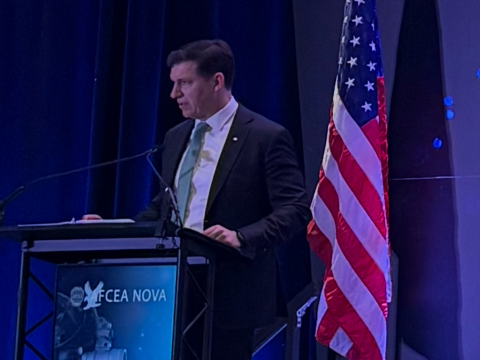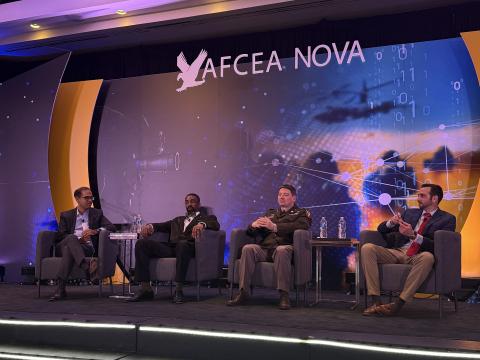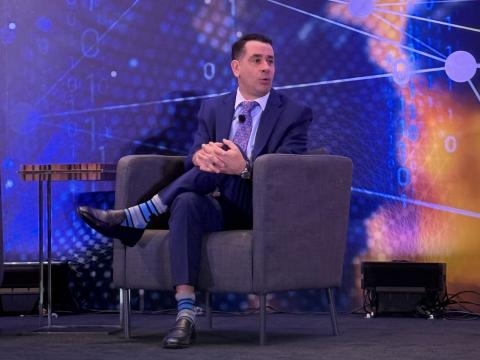The Third Offset Is Not a Destination but a Journey
Making innovation the prime driver of the U.S. defense community will require an ongoing, long-term effort, defense experts say. Known as the third offset, this endeavor is more of a methodology than an objective, they explained at a recent two-day conference.
AFCEA International, along with Second Front Systems and Business Executives for National Security, held the inaugural Offset Symposium February 14-15 in San Francisco to improve connections between venture capitalists and government innovators. The forum at the Marines’ Memorial Club aimed to advance the work of building the ties that bind innovative technology clusters such as Silicon Valley and the national security community.
Speakers discussed what achieving the third offset strategy might look like and how the country can get there. The strategy attempts to offset shrinking U.S. military technological superiority by investing in new capabilities and concepts of operation. Raj Shah, managing partner, Defense Innovation Unit Experimental (DIUx), stressed the importance of cultural change both in Silicon Valley and the Defense Department to accomplish the strategy’s aims. “I think the real mission of DIUx and what all of us here in this room are working on is not just the technology. The technology is critical, and it’s what gives us combat capability. But the real issue is culture change,” he said.
Shah highlighted the need for a more rapid acquisition process within the Defense Department and increased access to commercial technologies such as drones and artificial intelligence. He added that he is beginning to see companies in Silicon Valley view the department as a real customer.
Gen. Peter Pace, USMC (Ret.), 16th chairman of the Joint Chiefs of Staff and recipient of the 2008 Presidential Medal of Freedom, reiterated the need to break down barriers between government and industry during his kickoff keynote. “The door has to be open to industry. Right now, the third offset is not an answer; it’s a question. What is it?” Gen. Pace asked attendees. “It’s not a destination; it’s a journey. What I believe has happened over the last year is the [Defense Department] has reminded us that we are on this journey. We need to do this better and faster than offsets one and two, and we need the people in this room and your capabilities to maximize the opportunity.”
The reality is that no rational person will ever fight the United States symmetrically again, noted Gen. Stanley McChrystal, USA (Ret.), former commander, Joint Special Operations Command. “They are going to fight it some other way, which means almost by definition that whatever we prepare for is what they will not do,” Gen. McChrystal said during his keynote speech on the symposium’s second day. “I think the work all of you are doing may not win the war we’re in, but it may win the next one, or even better, prevent the next one.”
For success moving forward, “We need people to start thinking about things that don’t seem to matter as much in the here and now but will literally define the future,” Gen. McChrystal added. “We have no idea what the future is going to be, so we need to be incredibly flexible.”
In his closing keynote address, Gen. Keith Alexander, USA (Ret.), IronNet Cybersecurity CEO and president, laid out the challenge national security experts and the venture capital community must overcome to advance the third offset strategy. “The amount of unique information being created this year is more than the last 5,000 years combined,” he said. “That means that by the time current freshmen in college are juniors, half of what they learned will be outdated. We are training students for jobs that don’t exist, with technology that hasn’t been created for solving problems that we don’t even know are problems. So who’s on the front line of this? We are. This is cybersecurity.”
Gen. Alexander underscored the need for strategy development and collaboration to solve cybersecurity as a nation. “The vision has to go beyond the technology because technology is going to be outdated going forward,” he said. He sees massive potential in small companies, especially when they partner with or are financed by bigger corporations. “Our country is an innovation nation. The groundswell of innovation is in small companies,” the general concluded.
For more information on the event and speakers visit www.afcea.org/site/?q=OffsetSymposium




Comments